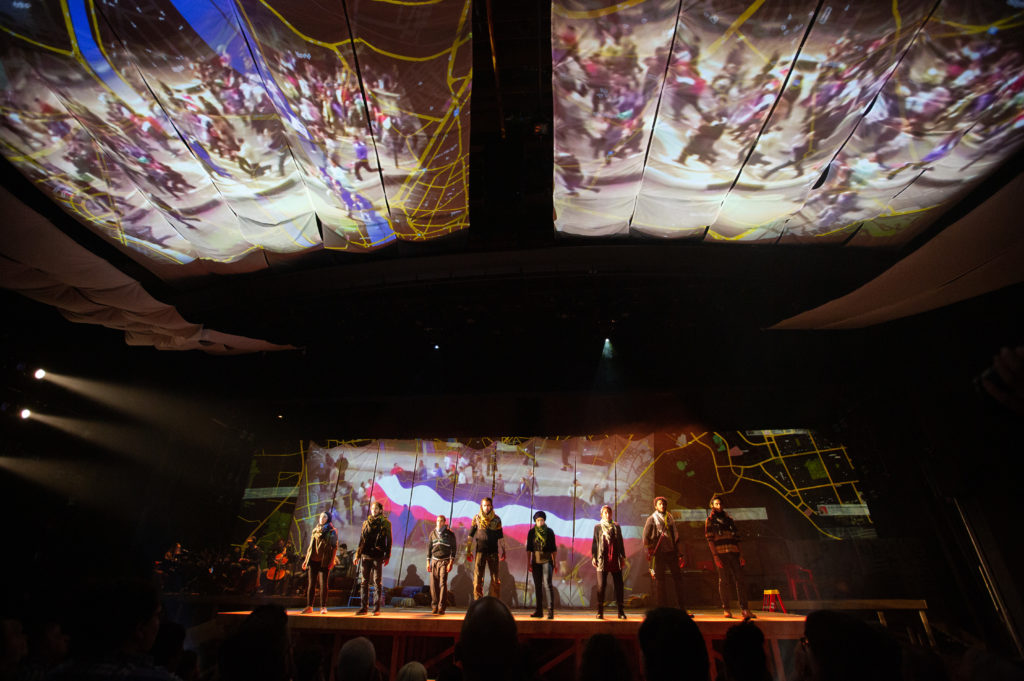
The cast of “We Live in Cairo.” Photo: Evgenia Eliseeva
Presented by the A.R.T.
Book, music, lyrics by Daniel Lazour and Patrick Lazour
Directed by Taibi Magar
Choreography by Samar Haddad King
Music directed by Madeline Smith
May 14 – June 23, 2019
Loeb Drama Center
Cambridge, MA
ART on Facebook
Critique by Kitty Drexel
(Cambridge, MA) There are a few things that must be established for a white audience to fully digest the A.R.T.’s production of We Live in Cairo.
- We Live in Cairo takes place in Cairo, Egypt. Cairo has a long, aggravated political history of fascism. Our own country is currently fighting a wannabe fascist dictator. Cairo’s problems are our problems.
- This is a timeline of the Arab Spring.
- The United States Census defines those of Middle Eastern or North African descent as white.
- People of Middle Eastern or North African descent living in the US do not consider themselves white. Neither do racists.
- The US inclusion of MENA in its definition of whiteness stems from slavery and the golden rule: the people who have the money make the rules.
- Fascism doesn’t go away on its own. It must be fought. Activists use the tools they have to do the work they must.
The A.R.T. programme includes informative writings such as “A Note From the Creative Team” and “Reliving Tahrir” by Tarek Masoud, the Sultan of Omar Professor at Harvard’s John F. Kennedy School of Government. These missives give perspective into the experience of developing We Are Cairo but they don’t provide a complete education (nor should they). The words of the writers are supplementary. An audience for this production must do their research in advance.
We Live in Cairo is an independent musical about an righteously angry group of Egyptian, activist rebels who wield weapons of artistry. When an innocent student is mauled to death by the corrupt Egyptian police force, these activists take to the streets in protest. The rebels must navigate impending adulthood as they simultaneously navigate the political landscape. We Live in Cairo is inspired by the January 2011 Tahrir Square protests. President Hosni Mubarak was ousted from power only to be replaced by powers much more stringent than he. A revolution is a circle.
Those of us who participate in the resistance will recognize themselves on stage. The desperation, gripping fear, rage, and overwhelming anxiety that we aren’t doing enough (our work will never be enough) flood the audience from the stage. And the joy does too.
Those of us who also live in constant despair that our rights will be unceremoniously stripped from us like spring wool from a suspicious sheep will appreciate the message that we are not alone. As we American social justice warriors fight for equity and democratic integrity so do our Egyptian sisters and brothers. It’s terrifying. It’s motivating.
The female characters sing about more than just romance and men. They are whole humans. We see that they perform the majority of the work and take the biggest risks. Meanwhile, two male characters are defined by their sexual desires. It’s subversive feminism and it’s delicious.
We Live in Cairo is under-served by the Loeb. We Live in Cairo is about people connecting with others to effect change. The musical’s characters, their intricacies and interactions, necessitate a more intimate space. The Loeb Drama Center is too large to shelter this boutique musical. The cast wants to interact with us as compatriots in the same fight. From it’s distance, the audience misses the finer moments of character bonding and ritual. Club Oberon (a venue without any Tonys) would have been better suited.
Audience members please note that strobe lighting is used in this production. Additionally, audience members with sensitive eyes may experience light blindness as the audience is sometimes lit with the stage lights for dramatic effect.
This musical comes to us by way of a the National Alliance for Musical Theatre’s Festival of New Musicals (2016), a partial development via residency at the Eugene O’Neill Theatre Center’s National Music Conference (2015), and a residency at SPACE on Ryder Farm. Presumably, the Loeb is its stop before going to Broadway. We Live in Cairo sounds like Hair meets The Band’s Visit. Arab folk gleefully pairs up with traditional rock sounds. It’s a marriage of genres that appeal to the ear and a dancer’s inclination to move. It has the potential to appeal to anyone who enjoys musical theatre.
